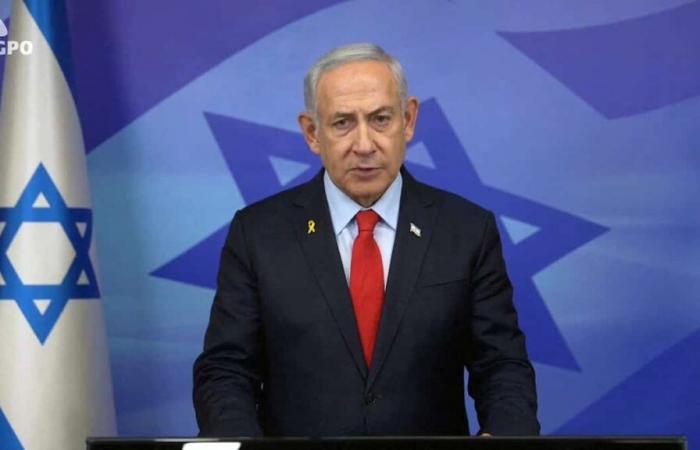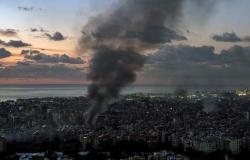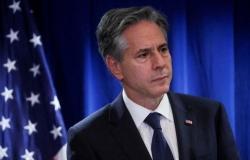Israeli Prime Minister Benjamin Netanyahu announced Tuesday that his security cabinet would adopt “in the evening” a ceasefire in the war with Lebanese Hezbollah, which should end more than a year of hostilities cross-border and two months of open war in Lebanon.
• Also read: Israeli strike on the heart of Beirut, massive raids on its southern suburbs
• Also read: Gaza: Civil Defense announces 11 deaths in nighttime strikes and shootings
The United States, the European Union, the United Nations and the G7 have all pushed for a cessation of hostilities between Israel and the powerful Lebanese formation armed and supported by Iran.
The Israeli security cabinet will adopt a ceasefire in Lebanon “this evening,” Mr. Netanyahu announced.
He warned, however, that his country “will respond” if Hezbollah violates the truce and will maintain “total” freedom of action in Lebanon.
A truce in Lebanon will allow Israel to “focus on the Iranian threat,” he said.
He was speaking at the end of a day marked by the most violent Israeli raids on Beirut since Israel launched a massive bombing campaign on September 23 targeting pro-Iranian Hezbollah in the neighboring country, then began ground operations in the south on September 30.
A ceasefire should also help put an end to the conflict in Gaza, American Secretary of State Antony Blinken said before the announcement of the agreement.
The G7 foreign ministers called on Tuesday for an “immediate ceasefire”, while the head of diplomacy of the European Union, Josep Borrell, declared that the Israeli government had “no more excuses” for refusing it.
According to the American news site Axios, the agreement is based on an American project providing for a 60-day truce during which Hezbollah and the Israeli army would withdraw from southern Lebanon to allow the Lebanese army to deploy there.
It includes the establishment of an international committee to monitor its implementation, Axios added, specifying that the United States would have given assurances of its support for Israeli military action in the event of hostile acts by Hezbollah.
Israeli Defense Minister Israel Katz warned Tuesday that his country would act “strongly” if an agreement was violated.
The international mediation was based on UN Security Council Resolution 1701, which ended the previous war between Israel and Hezbollah in 2006, and stipulates that only the Lebanese army and peacekeepers can be deployed to the southern border of Lebanon.
Mr. Netanyahu will, however, have to convince his far-right allies: on Monday, his Minister of National Security, Itamar Ben Gvir, estimated that a ceasefire would be “a big mistake”.
“Take revenge on the Lebanese”
Before giving the green light, Israel increased its aerial bombardments on Tuesday in the center of the Lebanese capital – where at least ten people were killed according to the Lebanese authorities – and its southern suburbs, a stronghold of Hezbollah, after calls to evacuate.
A Hezbollah MP, Amin Cherri, accused Israel of wanting to “take revenge on the Lebanese” before a ceasefire.
The Israeli army reported in the afternoon more than 20 projectiles fired from Lebanon against Israel. She also reported strikes in southern Lebanon and a ground operation in “the Litani River region”, to the north of which Israel says it wants to repel Hezbollah.
The war that has raged since October 2023 in the Gaza Strip between Israel and Hamas has spread to Lebanon after a year of exchanges of fire on both sides of the Israeli-Lebanese border.
Israel claims to want to neutralize Hezbollah in southern Lebanon, which opened a front against it on October 8, 2023 in support of its ally Hamas, to allow the return of some 60,000 inhabitants of the north driven out by its fire.
According to the Lebanese Ministry of Health, nearly 3,800 people have been killed in Lebanon since October 2023, most since last September. The hostilities have displaced some 900,000 people, according to the UN.
On the Israeli side, 82 soldiers and 47 civilians were killed in 13 months.
Before the ceasefire was announced, residents of northern Israel interviewed by AFP said they were opposed to it: “in my opinion, it would be a serious mistake as long as Hezbollah has not been completely eliminated “, declared Maryam Younnes, a 29-year-old student.
On Tuesday evening, demonstrators gathered in front of the Defense Ministry in Tel Aviv to protest against a deal.
According to the Ministry of Health, nearly 3,800 people have been killed in Lebanon since October 2023, most since last September.
On the Israeli side, 82 soldiers and 47 civilians were killed in 13 months.
22 dead in Gaza
The Israeli army continues its strikes on the besieged Gaza Strip, where at least 22 people were killed on Tuesday, according to Civil Defense, including 11 in a school housing displaced people in the north.
At the start of winter, thousands of displaced people are trying, with paltry means, to protect themselves from the rain and the cold.
The winter is going to be “horrible”, warned Louise Wateridge, a spokesperson for the United Nations agency for Palestinian refugees (UNRWA), while Gazans “have not had the most basic things for 13 months : no food, no water, no shelter.
The war was triggered by the unprecedented attack launched by Hamas against Israel on October 7, 2023, which resulted in the death of 1,207 people on the Israeli side, mainly civilians, according to an AFP count based on official data. including hostages killed or died in captivity.
The Israeli offensive carried out in retaliation in Gaza left at least 44,249 dead, the majority civilians, according to data from the Hamas Ministry of Health, deemed reliable by the UN.






